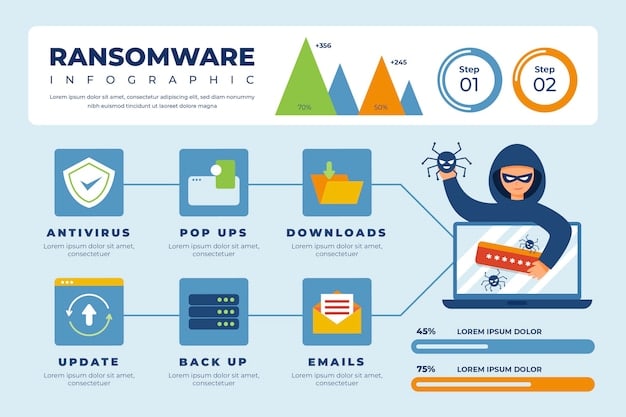FTC Investigates Tech Data Security: What US Companies Should Expect

The US Federal Trade Commission (FTC) is increasing scrutiny of data security practices among tech companies, potentially leading to significant changes in how these businesses handle consumer data and cybersecurity measures.
The US Federal Trade Commission (FTC) Investigates Data Security Practices of Tech Companies: What to Expect? This action signals a heightened focus on consumer protection and cybersecurity compliance.
Understanding the FTC’s Authority Over Data Security
The Federal Trade Commission (FTC) plays a vital role in safeguarding consumer interests across various sectors, including the tech industry. Its authority over data security stems from its mandate to prevent unfair methods of competition and unfair or deceptive acts or practices in commerce.
The FTC Act and Data Security
Section 5 of the FTC Act is the primary tool the commission uses to regulate data security. This section prohibits unfair or deceptive acts or practices, which the FTC interprets to include companies’ failure to protect consumer data adequately.
- Unfairness: The FTC considers a practice unfair if it causes or is likely to cause substantial injury to consumers, which is not reasonably avoidable by consumers themselves, and not outweighed by countervailing benefits to consumers or to competition.
- Deception: A deceptive practice involves a representation, omission, or practice that is likely to mislead consumers and affect their behavior or decisions about the product or service.
- Enforcement Actions: The FTC has used Section 5 to bring enforcement actions against companies that fail to maintain reasonable security measures, leading to data breaches or unauthorized access to consumer information.
The FTC’s authority is broad, enabling it to investigate and take action against companies of all sizes, from startups to multinational corporations, that fail to protect consumer data adequately. Its enforcement actions can result in significant penalties, including monetary fines, mandatory security audits, and requirements to implement specific security measures.
In conclusion, the FTC’s expansive authority over data security allows it to set and enforce standards for how companies handle consumer information, holding them accountable for failures to protect data and incentivizing them to invest in robust security measures to avoid regulatory scrutiny and penalties.
Recent FTC Actions and Key Focus Areas
The FTC has recently intensified its scrutiny of tech companies’ data security practices, reflecting growing concerns about consumer privacy and the increasing frequency of data breaches. Several high-profile cases highlight the key areas the FTC is focusing on in its investigations and enforcement actions.
Highlighting Recent FTC Cases
The FTC has taken action against several tech companies for failing to protect consumer data adequately. These cases often involve allegations of lax security practices, inadequate data encryption, and failure to implement reasonable access controls.

Examples include:
- Equifax: Following a massive data breach in 2017, the FTC reached a settlement with Equifax that included a $575 million fine and requirements to improve its data security practices.
- Facebook/Cambridge Analytica: The FTC imposed a $5 billion penalty on Facebook for privacy violations related to the Cambridge Analytica scandal, which involved the unauthorized collection and use of personal data from millions of users.
- Uber: The FTC settled with Uber over its failure to protect consumer data during a 2016 data breach, requiring the company to implement a comprehensive privacy program and undergo regular security assessments.
These cases underscore the FTC’s willingness to hold companies accountable for data security failures, even when those failures do not directly result in financial harm to consumers. The FTC’s focus is on ensuring that companies implement reasonable security measures to protect consumer data and prevent breaches before they occur.
In summary, the FTC’s recent actions highlight its commitment to enforcing data security standards across the tech industry. By focusing on specific areas such as data encryption, access controls, and incident response, the FTC aims to drive meaningful improvements in how companies protect consumer data.
Understanding the Scope of FTC Investigations
When the FTC initiates a data security investigation, it typically seeks to understand the full scope of a company’s data practices and security measures. This involves a comprehensive review of a company’s policies, procedures, and technical infrastructure.
Key Areas Scrutinized During Investigations
The FTC examines various aspects of a company’s data security practices to determine whether they meet the required standards. These include:
- Data Collection Practices: The FTC assesses what types of data are collected, how the data is collected, and whether consumers are adequately informed about the data collection practices.
- Data Storage and Retention: The FTC reviews how data is stored, whether it is encrypted, where it is stored, and for how long it is retained. This includes the use of cloud services and third-party vendors.
- Access Controls: The FTC examines who has access to consumer data, how access is controlled, and whether there are adequate safeguards to prevent unauthorized access.
The FTC’s investigations are thorough and often involve extensive document requests, interviews with company personnel, and forensic analysis of computer systems. Companies under investigation must be prepared to provide detailed information about their data security practices and demonstrate that they are taking reasonable steps to protect consumer data.
In conclusion, understanding the scope of FTC investigations is crucial for tech companies to prepare adequately. By addressing these key areas proactively, companies can demonstrate their commitment to data security and potentially mitigate the risk of regulatory action.
Preparing for an FTC Data Security Investigation
Facing an FTC data security investigation can be daunting, but there are steps that tech companies can take to prepare and respond effectively. Proactive preparation can help companies minimize the risk of an investigation and demonstrate a commitment to data security.
Steps Tech Companies Can Take to Prepare
To prepare for a potential FTC investigation, tech companies should take the following steps:
- Conduct Regular Security Audits: Perform regular audits of data security practices to identify vulnerabilities and areas for improvement.
- Develop a Data Breach Response Plan: Create a comprehensive plan for responding to data breaches, including protocols for notification, remediation, and communication.
- Implement Data Encryption: Encrypt sensitive data both in transit and at rest to protect it from unauthorized access.
In addition to these steps, tech companies should also ensure that they have adequate insurance coverage to protect against potential data breach losses and regulatory penalties. This can help mitigate the financial impact of a breach and provide resources for responding to an FTC investigation.
The Role of Data Encryption and Security Measures
Data encryption and robust security measures are critical components of any effective data security program. The FTC expects companies to implement reasonable security measures to protect consumer data from unauthorized access or disclosure.
Why Data Encryption is Essential
Data encryption is the process of converting data into a coded format that can only be read by authorized parties equipped with the correct decryption key. Data encryption is essential for protecting sensitive data both in transit and at rest. The FTC scrutinizes a company’s use of data encryption during investigations.

Benefits of data encryption include:
- Protection Against Data Breaches: Encryption can render stolen data unreadable, preventing unauthorized parties from accessing sensitive information.
- Compliance with Regulations: Many data protection laws and regulations, such as HIPAA and GDPR, require companies to encrypt sensitive data.
- Enhanced Consumer Trust: Demonstrating a commitment to data encryption can enhance consumer trust and confidence.
In conclusion, data encryption and robust security measures are essential components of any effective data security program. By prioritizing data encryption and other security measures, companies can protect consumer data, comply with regulatory requirements, and maintain consumer trust.
Potential Outcomes of FTC Investigations
The potential outcomes of an FTC data security investigation can vary depending on the severity of the alleged violations and the company’s willingness to cooperate with the investigation. Outcomes include financial penalties, injunctive relief, and requirements to implement specific security measures.
Financial Penalties and Fines
The FTC has the authority to impose significant financial penalties on companies that violate data security requirements. These penalties can be substantial, as demonstrated by the $5 billion fine imposed on Facebook for privacy violations related to the Cambridge Analytica scandal.
The size of the fine is based on:
- The severity of non-compliance
- The potential damages impacting consumers, due to non-compliance
In addition to financial penalties, the FTC can also seek injunctive relief, which involves ordering companies to take specific actions to remedy the alleged violations. This may include requirements to implement specific security measures, undergo regular security audits, and provide consumers with notice of data breaches.
In conclusion, the potential outcomes of FTC investigations can have significant financial and operational implications for tech companies. By taking proactive steps to prepare for investigations and demonstrate a commitment to data security, companies can seek to mitigate the risk of adverse outcomes and maintain consumer trust.
| Key Area | Brief Description |
|---|---|
| 🛡️ FTC Authority | The FTC enforces data security under Section 5 of the FTC Act, preventing unfair practices. |
| 🔍 Investigation Scope | Investigations cover data collection, storage, access controls, and compliance. |
| 🔑 Data Encryption | Essential for protecting data against breaches; FTC expects robust encryption methods. |
| 🚨 Potential Outcomes | Including financial penalties, injunctive relief, and mandates for improved security. |
FAQ Section
▼
The FTC enforces data security by ensuring companies protect consumer data from unfair or deceptive practices, as mandated by the FTC Act.
▼
Data breaches, consumer complaints, or evidence of inadequate security measures can trigger an FTC investigation into a company’s data practices.
▼
The FTC expects companies to implement reasonable security measures, including data encryption, access controls, and regular security audits for protection.
▼
Potential penalties for non-compliance include financial fines, injunctive relief, and mandates to improve security measures for companies being investigated.
▼
Companies can prepare by conducting regular security audits, developing a data breach response plan, and implementing data encryption to meet FTC standards.
Conclusion
The FTC’s increasing focus on tech companies’ data security practices underscores the importance of robust cybersecurity measures and consumer data protection. Tech companies must proactively address these concerns to avoid regulatory scrutiny and maintain user trust in an evolving digital landscape.





